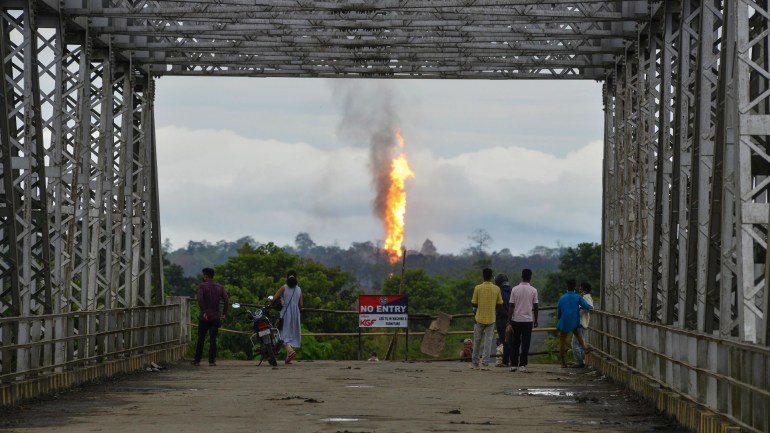India’s deadly oil well blaze extinguished after five months
Experts from Singapore, the US and Canada helped in dousing the blaze in Assam state that left at least three people dead.

An enormous oil well fire that raged for more than five months in the northeast Indian state of Assam has finally been extinguished, officials said on Sunday.
Engineers from state-run Oil India Limited (OIL) had battled the blaze in Assam state since an explosion on June 9, weeks after the well blew out and began discharging huge quantities of natural gas.
Keep reading
list of 3 itemsWe foreigners: What it means to be Bengali in India’s Assam
‘Gov’t killed my husband’: Why are detainees dying in Assam?
Two employees of the state-owned company died in the blast, which sent a wall of flame and huge plumes of smoke into the sky. A third worker died in September after an accident at the site.
Experts from Singapore, the United States and Canada joined efforts to contain the inferno, and Oil India spokesman Tridiv Hazarika said on Sunday the fire had now been “doused completely”.

“The well has been killed with brine solution and is under control now,” he told the AFP news agency, adding that the well had yet to be capped.
“There is no pressure in the well now and it will be observed for 24 hours to check if there is any amount of gas migration and pressure build-up,” Hazarika said.
Thousands of villagers in Tinsukia district had been relocated to relief camps after the blaze started.
A farmer who lived beside the site said his home was damaged by the fire and hoped his losses would be compensated fully.
“Even if the fire is doused, we cannot possibly go and live in that house any more – we lost not just our cows, goats, fields, crops, but our mental and physical peace too,” Akheshwar Chetia told The Indian Express newspaper.
The Baghjan oil field is next to the Dibru-Saikhowa National Park and the wetland habitat of several endangered species, including tigers and elephants.
The region is also home to several bird sanctuaries.
The Wildlife Institute of India said in a July report that the oil spill had brought a “large-scale impact” on local plant and animal life.
“The toxins released are known to have long-term persistence in soils and sediments, which will not only affect current life conditions, but due to sustained release over a long period, pose a serious health risk for a longer term,” the institute added.
The disaster has cost Oil India more than $30.5m as of late September, according to the firm’s quarterly financial results released last week.